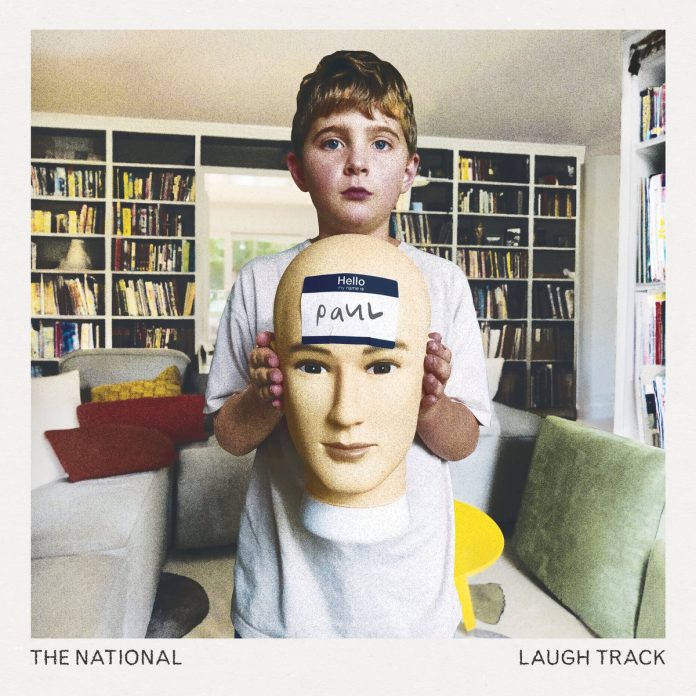“The National is your saddest friend’s favorite band” says David Letterman, who with his gibbous moon glasses, grown out beard, and all-casuals fashion looks exactly like an older version of Matt Berninger, the band’s lead singer. I am not here to theorize that Letterman is, in all actuality, Matt from the future (I am still collecting evidence), however I do intend to talk about The National’s latest album, Laugh Track – a surprise follow-up to the very recent First Two Pages of Frankenstein, which both delighted and divided fans with its meditativeness.
The National is characteristically an older band. Whereas their siblings in the New York scene (The Strokes, Yeah Yeah Yeahs) were college-aged at the time of their debuts, Berninger and co. were orbiting thirty, and they sounded like it too. Scenes of failing marriages, crises of regretful fathers; their music embodied post-youth melodrama and gave it a live score, each act in the story of their lives being soundtracked by its own album. While their contemporaries bled relevance or switched genres as the scene declined, The National proceeded on with their play. The rows in their dark auditorium gradually filled with critics and audiences alike – in 2018 their album Sleep Well Beast won the Grammy award for “Best Alternative Album”, beating out Arcade Fire and Gorillaz, among other bands, and in 2023 they played to sold-out crowd at Madison Square Garden (a nearly 20,000-capacity venue.)
In a word: The National are alive and well. Their old fans are still around, back problems aside, and their new fans are in a constant, growing mitosis, as the malaise of our time sends many a zoomer into an early midlife crisis. Oh, and there’s also the Swifties, who became National fans after guitarist Aaron Dessner set up a working relationship between his band and Taylor (Dessner co-produced Folklore, which won Swift “Album of the Year” at the 2021 Grammy Awards.) I could come up with a bar joke involving these three parties, but for now I think I’ll just skip to the laugh track.
Announced barely three days before its release, Laugh Track is a paradox of an album. It’s meant as a companion piece to First Two Pages of Frankenstein, yet its runtime is over twelve minutes longer, and while the majority of its tracks were indeed conceived during Frankenstein’s creative sessions, the album’s tone differs starkly from its predecessor. That last point is especially important here, as one of the major complaints regarding the band’s last record was that it was too laid back, comfortable merely to create an atmosphere and let it float. Laugh Track, in contrast, brings Devendorf’s drum beats back into focus, still maintaining the production style of Frankenstein but adding to it the moving energy of High Violet.
The opener, “Alphabet City,” begins like a roller coaster incline. A slight guitar tremolo starts our car’s movement, and with vague anxiety we’re carried up the rust-tinged tracks, each base kick and snare roll jolting us closer and closer towards a peak shrouded by clouds. “Sometimes I barely recognize this place; When you’re with me I don’t miss the world” we hear from singer/ride passenger Matt Berninger, dressed even here like a philosophy professor, and suddenly we’re at the top. Only, it’s here that our ride halts: our anticipation for the next turn dissolves, Matt slips into silence and we’re left only with a feeling of clarity described by a piano outro.
The metaphor of an unfulfilling rollercoaster can be fitted for each song on Laugh Track. While the energy is clearly heightened from First Two Pages of Frankenstein, it’s never quite released; tracks like “Space Invader” and “Coat on a Hook” lead us consistently to the peak of the incline, the former in particular making a moment of it with its three-minute crescendo, but that peak is as far as we go. There’s never a distinctive second half to round these songs off, like the piano switch-up in “Slow Show,” only a continuously developed first-half. Is this a flaw? Well, that depends on your perspective.
The National has always been a mature band, but with Berninger in his fifties and the rest not far behind him, it feels as if their maturity has grown more akin to wisdom. For them, the desperate search for purpose, which invigorated their old work and which defines not-so-young adulthood in general, has taken a backseat to the age-proportional desire for stability. They’re content, in their age, to create atmospheres from the moods of their lives and to explore them, not for lack of creativity but because that style is how they best express themselves now: it’s the most fitting soundtrack to this chapter of their lives. In that same vein, while this album is on a technical level more engaging than Frankenstein, it is still only through an appreciation of the spiritual structure that one can receive all of what The National put into this. For most people, I imagine, that is something that can only come with age.
At the time of writing this I am less than half the age of Matt Berninger and his bandmates. While I keep many of their past records close to heart (Alligator in particular is an all-time indie rock album, and I will defend it as such) I can’t pretend to be at a point in my life where this is the album that I need. On a purely analytical level, sure, I can appreciate Laugh Track, and it is ultimately a more fulfilling experience that its companion, but it’s only when I’m feeling old and washed up, wishing for stability, that lines like “I don’t need to be rescued; I just need to be pinned” cut like they’re supposed to. This is an album that, for the majority of fans in my age group, I imagine, will need to be returned to later on in life.
So, with that in mind: See you in 2053, Laugh Track.


